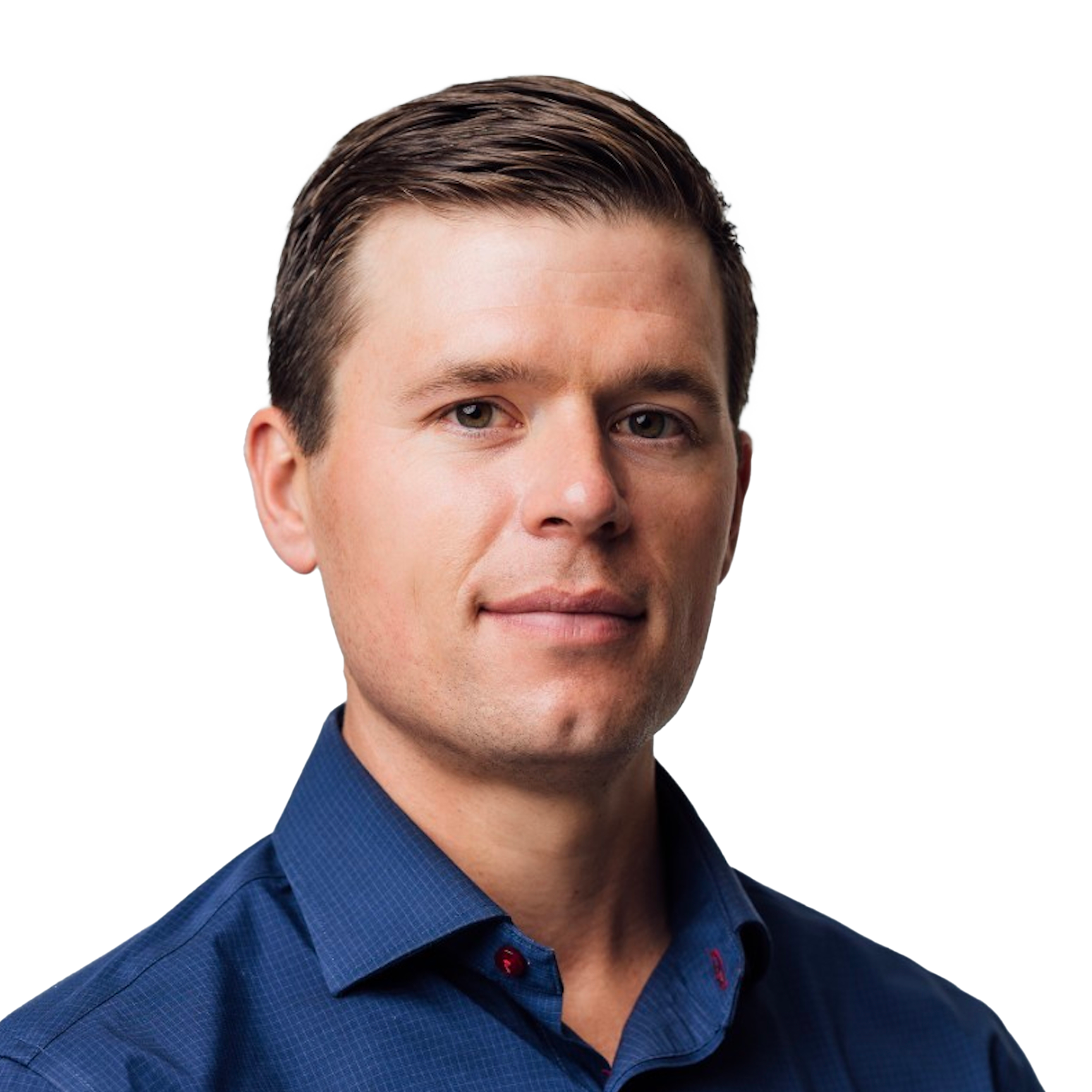
BACK TO PODCASTS
Gaurav Bhattacharya
CEO
|
Jeeva AI
Episode #
31
In this episode, Tracy chats with Gaurav Bhattacharya, co-founder and CEO of Jeeva AI, about his incredible journey from a blue-collar childhood in New Delhi to leading a fast-growing AI startup in the U.S. Gaurav shares his early love for coding, the lessons learned from bootstrapping and pivoting, and how his background in aerospace engineering shapes his approach to building complex AI systems.

In this episode, Tracy chats with Gaurav Bhattacharya, co-founder and CEO of Jeeva AI, about his incredible journey from a blue-collar childhood in New Delhi to leading a fast-growing AI startup in the U.S. Gaurav shares his early love for coding, the lessons learned from bootstrapping and pivoting, and how his background in aerospace engineering shapes his approach to building complex AI systems.
The conversation spans topics like tech debt, full-stack sales reps, the role of AI in sales, and the enduring importance of human connection in business. Gaurav also reflects on his personal definition of success, the long road to U.S. citizenship, and the mentors who shaped his leadership.
Whether you’re a first-time founder, an operator navigating change, or just AI-curious, this episode is packed with candid insights and practical wisdom.
Highlights:
- Growing up in New Delhi and finding purpose through coding
- Lessons from bootstrapping and exiting his first startup
- Pivoting GVA and going from $0 to $5M ARR in 7 months
- Why AI won’t replace great salespeople
- How to manage tech debt without losing velocity
- The human side of leadership during a crisis
- Gaurav’s vision to create a million jobs
Podcast Transcript
Gaurav Bhattacharya: [00:00:00] For young people, uh, you should either pick a side, like either you're as close to AI as possible, you're imbibing it daily, you're using it, you're in it, or you're as far away from AI as possible, right? Either you're a farmer, you're an electrician, or you're working HVAC. But there's no middle path. Like, pick a path to be successful, at least in the next decade.
Just pick a path and, and go with it.
Tracy Young: Hi, welcome to Path to Growth. I'm Tracy Young, co-founder and CEO of Tiger Eye. Today we are joined by Gaurav Bhattacharya, CEO, at Jeeva. Gaurav, welcome. Yeah, thank you Tracy. Thanks for having me. Excited to be here. Yeah. So before we go into your background, because you have such an interesting one, I wanna go way back to your childhood and maybe you can tell us about growing up and tell us about what you learned from mom and dad.
Gaurav Bhattacharya: Oh yeah, sure. So, uh, Tracy, I come from New Delhi originally. Uh, so I was born and raised in a very blue collar family. Actually lost my dad to cancer [00:01:00] when I was two years old. And, uh, mother's a blue collar parent. She doesn't even speak English. So she was, she did a lot of odd jobs. Uh, she was wa washing utensils and doing a lot of all, all blue collar work.
Uh, and I have a, I have a older brother and, uh, my brother's a very nerdy kid like me, so we love coding. Uh, he got a old Windows PC actually wanted, in like a Microsoft program, uh, on, on some scholarships. So I got a old Windows 95 pc and I was just hooked to it. So. I would just like hook up the 2 56 kilobyte, you know, the, the slow trend, slow internet connection, dial, dial up, internet connection, and, and would be online all day just coding, playing video games.
That, that's a lot of my childhood. I think I started coding. I. When I was 10 years old, built my first video game at 12 and I, I actually met a community of folks who were like young software developers like me and which kind of led to my first company. So I actually met my co-founder, who became my co-founder for my second company as well.
And she was a rockstar programmer that we met in a coding, [00:02:00] coding class in high school. So yeah, that was, that was my upbringing. A lot of like. I grew up poor. Uh, so, so we kinda, I didn't have much, but I think, I think we were blessed to have a great mother who worked super hard for us, and my brother was a great role model for me.
He loved coding, so I wanted to be like my brother growing up. So I would do whatever he does and. He was a, he was a very nerdy kid. Love programming and that's, that's kinda what I, what I studied as well.
Tracy Young: My goodness. I can't even imagine how hard it was for your mom, and I'm sure she is so proud of the two of you and, you know, the clear love and respect you have for your brother.
Um, I hope that she is, you know, happy with all her hard work and everything she
Gaurav Bhattacharya: was able to give you guys. Oh, totally. Yeah, totally. You know, she's, uh, such a simple way. I love her because we, she never like, unlike the. Like typical Asian parenting, they say, right? She, she was not worried about how we did in school or what we were doing.
She just cared about we were happy, healthy. Even nowadays, she's always asking me, and I was very lucky. My first startup was bootstrap Tracy, so we [00:03:00] didn't raise any money. We were able to sell it for approximately like $7 million. And between the three co-founders, we did a decently, we got each like two, 3 million each.
And. We were able to, like, I was able to buy my mom a house and help her retire, so to get her help so she doesn't have to work anymore. So she's having like a really nice, leisurely life now, and she's in New Delhi, you know, she, she goes to yoga, she does all that thing. But long story short, what I was gonna tell you is she always calls me and she's always like, did you eat your lunch?
Like, are you, are you, I hope you're not working too hard. I hope you're not stressed. Like, it's like the total opposite parenting, which I love, but at the same time, she's still stressed out about like. How hard we are working as kids and not really about like what we're doing, so, so in a way she's very proud of me, but at the same time, she would rather that I just chilled out and relaxed and work somewhere in a job.
And with a good health insurance, I think she would be happier.
Tracy Young: Uh, yeah. Wow. That's so sweet. I mean, you're always gonna be her baby. It doesn't matter how old you are. And of course, my, my mom's the same way. Um, she lives, she's always [00:04:00] wa I I get the privilege of ridden with my mom and my dad. Yeah. Um, but my mom is constantly watching all of us.
Now it's the grandkids too. Like she keeps track of how
Gaurav Bhattacharya: much food we are bringing into our bodies. Oh yeah, totally. And are you eating on time? Are you sleeping on time? Do you brush your teeth? Right.
Tracy Young: Yeah. Yeah, yeah. We, we are very lucky, you know, and it really shows all the success you've had in your life.
So you started as an aerospace engineer and computer scientist. Um, one of my colleagues says that you still code, you still write code on the weekends. Yeah. Now you're building AI sales agents. So walk me through how your background in aerospace is, has, if, if it has influenced the way you design, build, and think about complex AI systems.
Gaurav Bhattacharya: Yeah, I truly do. Uh, Tracy, one of the things I still wanna do and, and I, you know, it's like, that was in my childhood dream. I love space and I, you know, I, I even took a lot of flying lessons when I came to California. So, so that was super fun. I [00:05:00] wanted to be a pilot. I, I always wanted to design. Either a couple of things.
One would be like a fully electric aircraft, like, you know, I was very fascinated by Tesla and everything they've done, and that was like the next logical thing is to have electric aircraft would be so much better for everything, for the world, for, for global emissions, but also for ease of travel, faster travel.
There's a lot of things you could do. It's a very hard problem to solve, and that's something that I wanted to study and, and spend time. So after, after my startup, actually, I, I didn't go to college right away. I first skipped, uh, college. I, I worked on my startup. And, you know, talking about my, our mother, she definitely wanted me to go to school and get an education just in case.
And so I decided to, I was, I was lucky. I had some monies. I had the privilege of choosing what I wanted to do and I wanted to study something really hard. And aerospace engineering was very fascinating for me. So that's what I spend a lot of time with. And I also, uh, Tracy, I'm an immigrant here, so, so I actually started, right before I started Jibo.
I actually started an electric aircraft company, but soon realized that. It's [00:06:00] really hard for immigrants to start companies that you deal with air and space, because there's a lot of, uh, FAE regulations. It's really hard to also work with government contracts. So you need a lot of security clearances, especially for the founders to have it, which could be, you know, now, now I'm about to become a US citizen, so maybe, maybe if I sell GVA later or, or my next stint would be something, something in space to answer your question.
I think it was really fascinating. I feel there's a lot of complex engineering problems and even if nothing happens, it just gives you the ability to problem solve and that was really good, like systems design thinking, especially with AI doing a lot of the heavy lifting on the coding side. I feel like there's a lot of things you think about system design engineering, and that was very fascinating for me when I started aerospace engineering.
You're spending a lot of time doing aircraft system designs and just understanding how things work and how complexity works and you're not doing a lot of the lower level calculations. And I feel that's very similar to how coding is gonna become. A lot of the engineers are becoming product engineers, right?
Almost like with [00:07:00] Tiger, I can see where the data sources coming from. How are you, how am I gonna take all the complex data, make it simple to understand, make it cleaner for users? And how would I, what kind of rack systems am I gonna use? That's a lot of the engineers' jobs, not these days. Instead of saying that, okay, what functions am I writing and how, how, which tables am I storing data in?
So I think there's a lot I learned with aerospace engineering that directly applies to how we build Jibo. But also I think how, how engineers are gonna become product engineers in the future. So that's something I learned there.
Tracy Young: Something you said earlier makes me really curious, Mo mostly. 'cause I was recently over at uc, Berkeley giving a talk and I got to meet all these very talented young, young people, young founders who are trying to choose between university and they're keeping on their, their startup.
And it's kind of crazy that the university has startup accelerators, so they're encouraging the students to start companies. But you know, you can imagine it's in direct conflict with getting their degree from that university. And so here they are coming over to me and the question is like. [00:08:00] You know, you're an immigrant or you're first generation.
My immigrant parents are really against me starting a company. They really want, they really worked hard. They really want me to get a UCB degree. What is your advice? To folks like that because they think they're so young. But you did exactly that. Yeah. We're in a meeting like 17, 18, 19 year olds who are thinking about quitting school and starting a company, and we both know that if they're lucky, they get to run the company for the next 10 years.
Yeah. Right. And have no life. Or if they're really lucky, they're gonna be running it for the next 50 years and that's their entire.
Gaurav Bhattacharya: Span of their life. I totally agree. Tracy, one of the things that I wish someone had told me, which I didn't realize before, and Tracy, I think, I think, you know, when we talked last time, I was talking about when I started my company, I would see all the YC videos.
I've seen a bunch of, you know, your early days and all the YC talk. One of the things which was awesome is I think Paul Graham says this, but commit to the next 10 years to whatever you're doing because it's so true. And I never realized when I started. [00:09:00] My first company that it's gonna be such a long grind, even when you're failing.
And so obviously if you're successful and you're lucky, you're running it for 10 years. But a lot of unlucky people, if they stick it out, even they go through about a decade. Uh, if you think about it, a lot of like my failed projects was like seven years, six years, five years. Like it feels like 20 years.
But even like failed startups take a long time to like fully realize the value. Especially if you're doing like a B2B startup. 'cause you don't get instant kind of like feedback from, from the market. I think that's like the only advice, like I'm conflicted Tracy, like a part of me, like I love doing startups and I would not trade it for the world.
A part of me feels like, man, I wish I was just like a regular teenager or a kid when I was doing this. I feel like I have like four more I missed out on. Just like having fun in college. At the same time, I would not replace it for anything, but I feel if there was an alternate world. I could just be a kid and find an entry level job somewhere and have fun and, and learn, like, just to be normal.
Right. I think that [00:10:00] is interesting. Interesting too. I don't know how, what, what would you do, Tracy? Like what, what
Tracy Young: is what? Well, a little different for me, I started my first company at 25. I mean, I was very young, but I had gone through college. I had worked as a professional. I had fallen in love. I had got my heart broken.
You know, I had made friends, I had traveled. I, I was able to do all these things before. I, you know, got dumped into startups and a whole life of startups. Like would you, would you say that if you had an option, would I start, uh, would I start a startup in, in college? No, absolutely not. 'cause I would've missed out on so much of.
Being what's so important, like being a kid and being able to develop in that way. Like I really learned so much from my friends that I made and still, you know, I am still friends with them today and I would've missed out on all of those relationships
Gaurav Bhattacharya: for sure. I totally agree. So I think, I think in short sounds like.
I think both of us agree, like I think it's best to like just go to school. Kind of like let life come at you instead of trying to chase life. And then see what your [00:11:00] passions are, your interests are, what areas you're excited about, and make all these friends who you would eventually start businesses with.
I think that is really important still. So, so yeah. So in short, I still feel that. Maybe not a bad idea to go to college and, and finish your education. Have a fallback.
Tracy Young: Yeah. Um, I was taught that education's so important, you know, because the parents didn't have, I mean, I don't even think they, they went to like middle school, right?
So it's like you have to earn a degree. They knew the importance of education. No
Gaurav Bhattacharya: one can take that away from you. I totally agree. I, I spot on. Yeah. That, that's exactly like our parenting or it feels like very similar. My parents were taught the same thing as like, make sure you get a degree. 'cause they didn't have it.
That was one. The other one was like importance of getting a house or buying a house, right? Having one thing that you can fall back on. Oh, it's something that my right, like it's, it's, it's an American dream. It's an American dream, I think. Yeah. Maybe it's not wrong.
Tracy Young: Yeah.
Gaurav Bhattacharya: So
Tracy Young: you have been knee deep in gva.
Mm-hmm. For, I think it's like year [00:12:00] five or six now.
Gaurav Bhattacharya: Yeah. So very interesting story. It comes from a pivot, actually, Tracy, so it's year five for the company, but we started as a very different idea. It's only nine months in GE or maybe seven months in ge. So it feels like, obviously dog ears feels like seven years, but so, so we had a very, very short in, very quickly, we had an idea around customer retention and customer churn, and we wanted to build like a customer data platform.
And it was the ability to understand going to any company's environment, take their data and understand which com, which customers can change, which have upsell, cross sell potential. And that was something that we started building, we got very excited about. Uh, we made a lot of mistakes. Like we started building our own customer data platform.
'cause as, uh, you know, arrogant engineers, we thought that we should solve this problem from the ground up. And uh, it was very hard to go into a company and try to sell them on it. 'cause there's snowflake, there's other data warehouses that already exist. So our approach was like an apple. So we couldn't find product market fit, and we actually were almost running outta money when we went back to our board, Tracy, and basically told them, Hey, [00:13:00] we've tried everything, you know, you know, you know us.
You've worked extremely hard at this. We can't solve this problem. Do you wanna walk away? We have some money left, we wanna return capital. And our board was like, what are you gonna do next? And I said that, Hey, we built GVA internally. So we had such a small team, Tracy, at one point we were 50 people. We went back to like five people or four people basically.
So everyone was doing everything. 'cause we still had a $2 million customer base within Vol ai. Uh, that was our pre pre pivot product. And so we were trying to chase this new idea we were building. So we basically like didn't have any salespeople. We were automating everything from finding leads, enriching data outreach to just like back, like book back to back discovery calls for just me.
And I was the only sales guy on the team. And we said, Hey, this is working. We want to try this. And the board was like, we love you and we wanna back you, you know, we'll give you a little bit more money to keep going. So that's kind of what we did. So we pivoted about seven months ago and it's been a really quick journey from zero to 5 million, and now we're trying to get from like five to 15, maybe even 20 this year.
And, uh, so, so it went from like [00:14:00] five years of grind and nothing working. Do like, feels like. Okay. Now if you find found something obviously completely different, well
Tracy Young: congratulations on finding product market fit.
Gaurav Bhattacharya: Yeah. It sounds
Tracy Young: like it's been so hard of a grind and um, to get that you just feel it in every cell of your body.
Yeah,
Gaurav Bhattacharya: that totally, that's exactly right. I feel like, you know, what is product market fit is such like a question. It's like if you have to ask that question, you probably don't have product market fit. Right? That's kind of what I've learned now. How do you see AgTech AI transforming the sales development process?
Yeah. Yeah. Tracy, so, so I'm, I'm actually a believer of not ai, not replacing people. There's a lot of startups who are trying to basically build ai SDRs, ai BDRs, ai, rev ops, or, you know, AI salespeople. I feel people buy from people they trust. And, and you've done, for your startups, you've been in enterprise sales, so you understand this.
It's more important than ever in the age of ai. What I, what we do feel, Tracy, is like everything that's manual, repetitive, labor intensive, like. Finding leads, enriching data. You know, trying to like do deep research on every single [00:15:00] prospect and customer and prioritizing lists and cleaning everything. And maybe even with Tiger Eye, right?
Like looking at where you're falling short and which reps are doing well, which are not, what's the analysis? I feel AI is so good at that and that, you know, it can really literally take. 99% of the time that sellers waste on not selling activities, AI can do better, faster, cheaper, and then the out of like doing a great discovery call, doing an amazing demo, like carrying out the sales cycle, negotiating, we feel the reps should do and they can do better.
What I believe in what's gonna happen in sales is like almost back to the nineties, like instead of like these hyper bifurcations of roles like SDRs, BDRs, you know, like, uh, AE Junior, senior AEs. Solutions architects, sales engineer, then implementation manager, CSM, account manager. I feel there might be more full stack reps.
That doesn't apply everywhere, but I feel that that is more realistic in ai. Kind of like full stack developers, you'll have full stack sales reps who can now carry out prospecting with a tool like GVA or chat GPT or, or Clay or something like that. And then, you know, [00:16:00] a, a leader who can use Tiger Eye to do analysis of all their reps, and then you have a CRM system.
Then now you have five sellers instead of a 20% team doing so much more and maybe still achieving five, 10 million in Coda every year by just doing like a full stack of everything. So that's something I feel is happening in sales. So everyone will have to upskill pretty quickly. Some people might be great.
Hunters might not be good closers. Maybe AI can assist them. Some people might be graded closers. And, and not hunters, which is, I feel like 95% of the rep, no one, no one loves hunting these days. I feel the rep like AI can really help in that piece. And you can have sellers doing every, like, a few more things, um, and, and carrying, carrying bigger quotas.
That's, that's what I feel is gonna happen.
Tracy Young: Yeah, I totally agree. I is so powerful that it can really supercharge our reps and supercharge our team and, you know, in our case, analysts and the whole sales and marketing team. Exactly, but there's so much work that these teams do that I just [00:17:00] don't see AI replacing anytime soon.
And it's really the human element of all this, right? Like how are they gonna, you know, like half of their job is talking to people internally and like working their problems together and taking their tribal knowledge and like the human heart perspective of a deal and figuring things out. Sure, AI can do some of that, but I just.
I just don't see it replacing it anytime soon.
Gaurav Bhattacharya: Yeah. Spot on res. I think that's that's so true and I completely agree with that. I think that a human element, until people stop buying, I feel it's gonna be really hard to replace people. There was like somewhere I read, somebody was saying that people will need like sales reps anymore.
I almost disagree. I almost feel. The world's gonna need maybe like a, like a hundred million more sellers and a hundred million more software engineers. Like almost the exact opposite of like, I think Azure, please, if you think about, if you look around yourself, trace even all the code gen solutions, people need more software engineers than ever, right?
Like any company I speak with, any founder I know, small business, large, large business, everyone's in [00:18:00] need of good quality software engineers. Even with all this automated code gen solutions, I think the same applies for like great salespeople. There's gonna be room for good sellers and even more.
Salespeople in the world. I think that's, that's what's gonna happen.
Tracy Young: Yeah. The jobs just shift over from one thing to the other. With, with technology. Let's talk about tech debt. I get to speak to a still programming CEO founder. Yeah. Like how do you balance developing and iterate and quickly and then the mountain of tech debt that happens at every company.
Gaurav Bhattacharya: Tracy. I mean, it's so real and it's such a frustrating problem. Sam Altman has this really nice code, which is like, startups are binary. Either you win or lose, so screw tech debt, it's like a great problem to have. Just keep going. You'll solve it when you're successful and, and when I, when I don't code and when I'm in sales calls every day or I'm talking to investors and fundraising, I hate when my engineers bring this to me and they're always like.
We should change the stack. I'm like, I'm like Sam Altman's code. You know, like I just sent the video to them. I was like, startups win or lose, don't worry about this, you [00:19:00] know? But when you are in it, then you can truly realize the frustrations of like the, maybe the customer's facing or things that just can't get patched away really quickly because you use the wrong database and now you have to do a query optimization and it's expensive and it's time consuming and it's doesn't actually help the customer in any way.
But it might be useful. In the future. It's such a hard trade off and uh, it's like one of these problems where it's really hard to empathize it unless you're in it with the engineers and you're kind of seeing the frustrations or, or slowness. I try to ruthlessly prioritize it. Tracy having with my last startups, viewer technologists, through and through, and we spent a lot of time, effort, and money and just building beautiful systems, great design, everything working perfectly.
You know, like. Like for, for one of our companies. I remember like one of our products, Tracy, we only had like 500 users, but we optimize it. What if we had 10 million users concurrently using it, so we should design the solution to work for it. We were young and we had no idea that it would, you know, we, we [00:20:00] obviously thought that it.
One day it's gonna scale up and it's gonna be so big, but we still spend so much time, effort, and money in kind of doing that. So I think I've become smarter over time in understanding that, you know, what it, what can impact us now and what are things we can live with and we can tolerate. Uh, so it's a trade off.
There's no easy answer to this, but I would say maybe take the debt that can impact and bring you some wins. Like in this month or this quarter, instead of like, wins that can impact next year. That, that's kind of been my focus. Unless you're like opening high and you have, you know, 80, like a hundred billion dollars and you can invest like three years in the future because that's, that's exactly what you need, right.
In order win against Google. But I think in the early, early days, I'm, I'm, uh, I'm. I'm, I'm a bigger believer of let's take the debt on and we'll solve it when we go, when we become bigger.
Tracy Young: Yeah. Um, I, I totally agree. There's obvious things that you have to fix, right? Like if there's stability or quality issues that are making your product crash, like you've got to fix that right away.
Gaurav Bhattacharya: Totally.
Tracy Young: Obviously. [00:21:00] Um, and then there is also the environment at which our dev team works. Like it has to be a good enough environment. There's always gonna be stuff that annoys 'em, and then it's just about making sure it's not so annoying that they're gonna leave because you're gonna build more and the company gets bigger and you'll just figure out how to fix it, how to
Gaurav Bhattacharya: make it better.
I think one thing that you may appreciate as like a second time founder and like a very successful founder, which I, I didn't know. But I spend a lot of time hiring these expensive people, right? We all do, right? We get like really good talent and especially leadership talent, once their team's growing and they always come up with their hypotheses of what's good and what's bad.
And I always thought that I gotta trust this person 'cause we're already paying them so much money. We are, we are. Bet on them. You know, everyone. Wants them to be successful, including us. And then they would come in and be like, you should shift right? The whatever it is. Like shift to like next js, why aren't we, why are we using React for front end next?
JS is the future. We should change it. Or why are we not using Python for this or that? Or [00:22:00] could be the same way. Why aren't we using Pardot or HubSpot or instead of this solution? And I think the funny thing is, what I realize now of being a second time founder is everyone is very opinionated about what they should work with.
And it has nothing to do with what's better or worse, but what they like and what they're comfortable with. So. As long as you can like ask meaningful questions and kind of figure it out. Like if only I had a dollar for every salesperson who would come in and wanting to work out a different tool. That's one.
And then the second would be like for an engineer to say that we should be changing our stack to be on something else. I think those are like the two that I hear so often. Uh, and I feel every founder's probably gone through this.
Tracy Young: How has your definition of success changed over the years? It's a, it's a very, it's a very unique, let me, let me re let me, yeah, let me rephrase the question.
You know, what would you like to happen 10
Gaurav Bhattacharya: years from now? Great question. And tra Tracy. I feel like when I was younger, I was definitely thinking of success as like, very candidly, like we grew up very poor, so money was very, yeah. Mm-hmm. When I was growing up, I was like, oh man, I just wanna. Be successful, which could be like, how much money am I [00:23:00] getting?
Like what's my salary? What could be my title? What should I be doing? How much, how much can I sell this for? I think that was very meaningful for me and it was very important. I think when I got like, and I don't think that's a bad thing. I feel like you need some baseline, some monetary things to make sure that you're not, you know.
In miserable condition. I feel once I got that, I think my, my success, like I really wanna do really big things and for me, it's a couple of things that really excite me that I would love to chase and who knows where the Uck will land and what, what they'll be able to do. But it would be like, one of the things I'm really excited was like having like an I like an opportunity and doesn't mean that we get there, but an opportunity to build the next.
Google or Facebook or Atlassian or Right, you call it, right? Like like the next graph, right? Like or the next plan grid. Like you, like whatever that next big thing is. Like having the opportunity to do that I think is very exciting for me and I think even that's being like successful. I would love to like just wake up every day and think that we have a shot [00:24:00] at building the next Nvidia and or something, right?
And, and whether we get there or not, but I think that in that. Really excites me, motivates me. One thing that I'm really passionate about, Tracy is like creating jobs. I would love to be able to, that can impact a lot of people. That's why I'm like the opposite of the sales guys trying to say that, you know, we have to replace people.
I'm al almost the opposite of it, and I feel one of the things I'm really passionate about is like, can I create a million jobs in my lifetime? Uh, right. And, and hopefully it's meaningful. Those jobs create a lot of value for the community and everybody. Those like couple of things I feel. Is like what success means to me personally.
Tracy Young: Love of our country. I'm first generation American, and I don't think that I would've gotten the opportunities that were given to me that I had, you know, and the career that I've had if I wasn't in the United States. And I am so, so happy. We are finally making you a citizen of this country. And we didn't just [00:25:00] make it happen because you have been creating jobs here and like paying taxes and making this economy stronger and just to.
Hear your vision and your dream. It's uh, it's really, really inspiring to hear. So I'm rooting for you guys and I can, I can see it even over this call. I can see it in your face and hear it in your voice that you sincerely mean it, that this is an important mission for you. I agree. And you're
Gaurav Bhattacharya: gonna do it as an American.
That's amazing. Thank you. That's huge. I appreciate that Tracy. Immigration is such a. Hard challenge and I bet like you must have seen your parents go through it and I, I, I think I was reading some of the perplexity, CEO is still not a citizen and he's actually not even on a work visa. Yeah. The same thing happened to me.
It was super hard to get a, we call it a H one B Visa Tracy, which is like a work visa. Yeah. And if you were to start a partner, it's so hard to get a H one B visa. The regular requirements are you have to be in a, the company has to have have like something like $5 million in their same, like who has $5 [00:26:00] million when you're starting out?
So it was like, I had to go through so many like, and I wish, like I think immigration is a problem that we still need to work so hard on. Uh, especially all the fir first generation kids are building like these multi-building dollar companies creating like thousands of jobs. Uh, yeah, that's definitely something that I'm very frustrated about.
But yeah, I would be excited. It would be awesome to become an American. I love this country. I feel, with all the flaws, I feel there's no better opportunity anywhere in the world to come and build anything you want and be anywhere you want. Mm-hmm. So, mm-hmm. So I love, yeah. I, I, yeah. Obviously I would love to give back to, to this country, to our country.
So, so I feel, I feel very, very amazing here, but the world's catching up, right? Like all the work that India and China are doing, like, everyone's like competing. So I feel like America needs to just. Stay American and uh, and you know, and let immigrants do it, do its thing, and work hard and increase the GDP of the, of the country.
Tracy Young: Yeah. And that's what makes this country gay. Great. I mean, aside from the Native Americans, literally [00:27:00] everyone, every family who is here, immigrant was an immigrant at some point.
Gaurav Bhattacharya: Yeah.
Tracy Young: Yeah, spot on. Alright. We're not gonna get political, but there are things that are obviously working for our country and I'm very happy.
It's um, you know, some things are in the right direction. So what's your long-term goals for gva? I think you talked about creating jobs. What else? Anything you wanna share here with our listeners?
Gaurav Bhattacharya: Yeah, the other thing would be, Tracy, one thing that I've seen in sales. That hasn't happened yet. So I'll give an example.
Like for, for software development now, they're really nice tools like Cursor and Windsurf that have been growing like crazy and people live and breathe out of it. Like I use Cursor every day. I love it. I'm in every day. Obviously there's other alternatives that we can go to, but for developers, there's an IEDE where you sit and you work and you spend so much time and you love it and you code out of it every day.
Obviously there's platform like GitHub and stuff. I feel like Salesforce wasn't able to do this. For SA sellers, like people don't love being in Salesforce every day and they don't spend a bunch of their time every day. What we are seeing in GVA is either they're in email or [00:28:00] calendar or in gva. They spend a lot of time in gva and that's really exciting for me and it would be awesome to create like some product that is so good and we are not there yet, but something that's.
Truly addictive where sellers and salespeople and go to market teams can just be in it and live and breathe out of it or spend a lot of time because they just love the product, not because they have to log in notes in the field, unless the, the VP of sales would not count the deal if they don't log it in Salesforce.
I think that that part makes me excited. So long, long term, let's say 10 years from now or five even five years from now, if you're able to create like the notion or the, you know, like the Gmail or the the IDE for sellers, I think that could be be super cool, right? I don't know if that would good for business.
Like does that mean that we are right cheap product that. Actually, it doesn't make that much money. I, I don't know what that would, would be, but I would love to create a super addictive, viral, kind of like a product that salespeople just love and live out of. So that's something, and that's a very big debate in our company too.
[00:29:00] 'cause we're always wanting to listen to the VPs of sales and CEOs who pay us versus. Sellers. You know, I'm always telling my team that, hey, we gotta listen to the sales reps who are living and beating and working out of the platform every day. So I think that could be a really cool vision to, for, for gva.
Tracy Young: Mm-hmm. Really cool. Um, can you tell us about a mistake you've made?
Gaurav Bhattacharya: Ooh,
Tracy Young: at some point. Can you share anything come to mind?
Gaurav Bhattacharya: Yeah, so I'll talk about a very funny mistake that I made and I think everyone probably has done some version of this, but I had an internship, uh, when I was in school and actually that that was almost like a guaranteed job because my brother worked at that company.
So he worked at PricewaterhouseCoopers and he got me an internship there and I was an intern. I was supposed to like do something and I was. I had a manager who was also, I think he was, he, I, I think my manager was also 25. We were young. We were all young and, and he was a first time manager, so he was complaining about someone.
And in order to like build morale, I would just, we would banter about this colleague who was really slow, uh, in the team or so, or, or something. I, I, I don't even remember exactly, but basically what I did, [00:30:00] Tracy, is I emailed and instead of like emailing my manager, I mass emailed everyone in the company, like agreeing with my manager about this, this particular person.
And I was such a. Stupid thing, but it became a really big, big issue and both of us were fired and, and now he has a job. He works at Google. So, but it was like so sad and so funny at the same time. But it just talks about email ethics and just being like, careful, like, like now I have like a delay in Gmail.
They have a really cool feature. I don't know if you've seen that, but. It's like a three second delay, five second delay. But oh my gosh, you're traumatized just in case you mass email. Yeah, I, I emailed everybody. I think it had like the VP of the, like three VPs in the company like the, the India Indian CEO of price, scoopers, and everybody got that email and they were like, who is this guy?
Like the human worker? And obviously next day I was fired and then my boss was let go. Soon after, but it was like, it didn't cost me anything. It cost my manager his job. He was doing really well, unfortunately, but just like simple things like that. Right. Just double checking your work, I think. I think that was [00:31:00] like, like we all made email mistakes, but that was like mine and I made it
Tracy Young: not talking smack about your colleague and then sending it to the whole company.
Gaurav Bhattacharya: I. How was like a mistake that came, came to mind right away?
Tracy Young: Oh my gosh. Um, you know, my rule of thumb is just like write emails that well first don't, like, don't speak destructively behind people's back. Like, go, go speak destructively in front of their faces, like it's so, and then, and then write emails that I just assume everyone's gonna read it.
That it could be forwarded on. Um, so thanks for sharing that. It's pretty funny. I mean, you know, totally understandable as a young man coming into the workforce, so leaders can be made or broken when things get tough, how do you deal with the crisis?
Gaurav Bhattacharya: Ooh, yeah. That's such a, such a good question. I feel like the pivot was a big crisis for us, and, and it was, it was very, very, very hard.
Tracy, I feel like. Being open, vulnerable, honest with everyone, you know? Mm-hmm. Doing mm-hmm. As one-on-ones as possible. Uh, I usually don't do one-on-ones, but when things are tough, I try to do as [00:32:00] many as possible and try to spend much time with people individually or in group settings. Either it's like motivating them, but I think vulnerability and being sincere is very important.
Um, I'll give an example. When, when we did, when we did our pivot, Tracy, I had the same people that were with me since the very beginning, and it was almost a time where. Imagine like we had sold some people on, on this vision a, let's call it Vision A, and we had taken money for Vision A and we had investors who had given us money plus the team who would wake up every morning and then all of a sudden I had to tell them that we have this vision B, that I personally don't know if it's gonna be successful or not, but I want you to, you know, work on Vision B and also.
Because we don't have any money you like some people will have to keep working on this vision A and the customers because that keeps lights on and the other group has to work on B because you have to find product market fit. So how do you motivate the B folks to work on the right thing and for the A ones to not have fomo that they should be working on this new thing instead of the recent time talking to customers.
We're gonna let go at [00:33:00] some point. So I think like. Tons of discussions, having clear objectives, we follow. OKRs is very important for us. So just having clear objectives, clear key results is very important. Being more present, I feel like. Mm-hmm. I've seen like so many CEOs do this and, and I haven't had the opportunity to run like a thousand person or 5,000 person team, but you've seen like Zoom layoffs that happen right where the CEO, like they get a mass email and all of a sudden everyone's let go.
The next day, or like there's a one zoom recorded session that happens. I just don't understand that and I, I don't get it. I feel like that, you know, you just lose, it takes so hard to build trust and you can lose it like that. And I think those are like opportunities for you to be present as a leader.
Mm-hmm. Um, and, and be in front of your team. Mm-hmm. You've probably had like, tons of crisis situations, Tracy, in your career, like what's top of, what's the, what's the thing that you do to continue having trust and morale when things get tough? I think it's just a lot easier
Tracy Young: to speak openly with everyone.
So I, I agree with like being vulnerable and being [00:34:00] open, being there for the team. 'cause everyone at the end of the day is probably worried about like, what does it mean for me? And, and then we also have to remember like. The reason everyone cares so much is because everyone has things they need to take care of in life.
They've got rent to pay, they've got families to take care of, and you can't, you can't forget about that, that part. Um, and I think as leaders, we have the responsibility. To serve our employees and serve our customers. That is actually the job here. So I agree with everything you've said. Tell us about one person who's helped you become the leader you
Gaurav Bhattacharya: are today.
Uh hmm. So, so one person and, and she's no longer with jva, but Samya, uh, is was my co-founder for my first startup. And she's awesome. She's a great product leader. She's a great engineering leader. I would say she's, she, like, she was always a yin to the yang there. I think I learned so much from her and her style of leadership.
I think like I, I learned a lot of like. Empathy, but she, she does like simple things, like a lot of reflective listening. And I think like that's one thing that I've learned from her and, and I always joke [00:35:00] and I say like this, like one skill I've picked from her that she's so good at that I feel like more leaders need to be better at.
Right. Just like. Understanding and listening more, but not just listening to listen, but also like making sure the other person knows you're listening. So small things you can do, like summarizing or just reflective listening. And I think she, she taught me that and I carry that everywhere in every sales call, every investor call, every like tough employee call or whatever it is.
I feel that's one thing. So I think she, she's awesome. She decided not to, you know. Pivot with us because she's al, she had already worked like 10 years, you know, in a startup, and she wanted to take a break, take care of her family. But, but she was like, she's one like person that I can totally say that, oh man, I've learned so much from her person, better leader.
Uh, right. Be, be more empathetic. Like think about users, think about customers, think about employees. I think that's like, that's one person that comes to mind for me. But I think so many, I always say like. You know, self-made would be like a wrong thing. I feel like so many people have helped me, like from investors mm-hmm.
Like [00:36:00] customers to mentors. I feel like, you know, like I technically I shouldn't be here. You know? Like I, I feel like I would be the most successful kid in my cohort where I grew up. Like everybody was very poor. We come from like a. You know, like a completely blue collar neighborhood to like being in the us, being in San Francisco, being in California to doing, having a shot at doing all these amazing things.
So, so I would say like I can go hun hundreds of people, but that's like the first person that came to mind for me.
Tracy Young: Yeah. Yeah. There's this really beautiful, um, it's on YouTube, um, Fred Rogers, you know, Mr. Rogers neighborhood. I don't know if you watched as a kid. Um, I have my kid, my kids can have unlimited Mr.
Rogers. They usually like limit to like three episodes before they get bored, but. Gosh, he's getting, I think his lifetime achievement award. And for his speech, it's very short. He just says like, I wouldn't be here without the help that's been given to me along the way. And he says like, I want us to take the whole crowds looking at him.
It's like, I just want us to take like 10 seconds. I want you to think about someone who's helped you along your way. And you see the [00:37:00] camera panning across the audience and everyone is like getting choked up, like people are crying, thinking about, you know, that one person who's helped 'em. And, um, and it's just such a beautiful moment captured, um, on film that I, I, I often think about that, but it's really, really special for you to, you know.
For your co-founder to come, could come to mind in that way. I think for me too, my co-founders have had that impact on me as well.
Gaurav Bhattacharya: That's awesome.
Tracy Young: Yeah, that was such one. I'm gonna watch this speech. Sounds
Gaurav Bhattacharya: amazing.
Tracy Young: I'll send it to you. Last question, parting advice. You know, think about whoever's passing by our podcast listening.
What is the best parting advice? You know, you might not ever meet this person, but they might actually get something valuable. So this is an important moment.
Gaurav Bhattacharya: Okay. Besides, besides, you should use Tiger Eye. We are starting to use it. We love it. That's like obvious. That's given. Uh, actually one thing that comes to mind, Tracy, is uh, so, so Jack Altman is one of our investors.
I don't know if you know him, but he's Sam's brother, the CE of Open ai. Jack says is one thing which I love, and he said [00:38:00] this recently in, I think a tweet somewhere, but he said that, uh, oh, well X now, right? He is like, it's still hard for me. I still call it Twitter. Yeah. Yeah, me too. I feel he said this one thing, which.
You said that for young people, uh, you should either pick a side, like either you're as close to AI as possible. You're imbibing it daily, you're using it, you're in it. You're probably working for a company like yours or with open AI or somewhere, or you're as far away from AI as possible, right? Either you're a farmer, you're an electrician, or you're working hvac.
But there's no middle path. Like pick a path to be successful. I truly agree with that. 'cause I see a lot of people, even in my team, outside my team, there's people who are very reluctant to try different things in ai. And I hear that from our customers sometimes and they're like, no, no, no. Like the emails AI right, is like not as good.
You know? I can do so much better. I totally get it, but it's gonna get better over time and you just have to like. You have to imbibe it if you wanna be successful or pick a path that you're doing something totally different, right? You're an artist and you're making artisanal pizzas in Italy. Very different path.[00:39:00]
So I, I think that's one thing that comes to mind for me, is pick a path in order, at least in the next decade, in order to be ultra successful or even successful of whatever success means to you. Just pick a path and and go with it. That would be, that would be my advice to like people who are listening to this.
Thank you so much for this conversation. Absolutely. It was a pleasure. I really enjoyed it. Tracy, thank you for having me.

.png)













